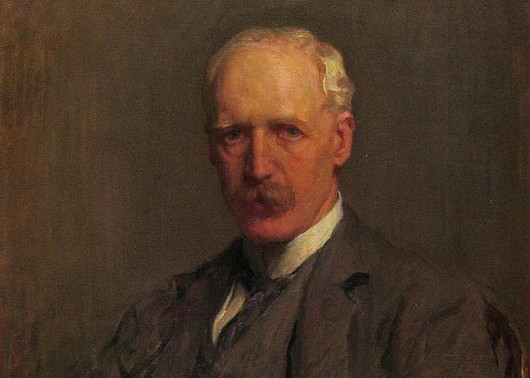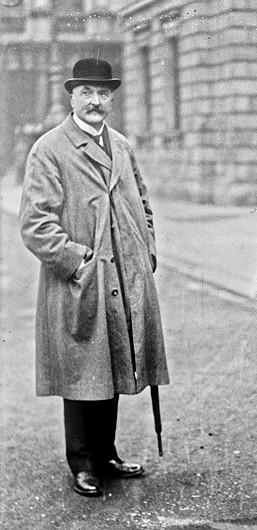Fianna Fáil
About Andrew Cusack
 Writer, web designer, etc.; born in New York; educated in Argentina, Scotland, and South Africa; now based in London.
Writer, web designer, etc.; born in New York; educated in Argentina, Scotland, and South Africa; now based in London. read more
News
Blogs
Reviews & Periodicals
Arts & Design
World
France
Mitteleuropa
Knickerbockers
Argentina
The Levant
Africa
Cape of Good Hope
Netherlands
Scandinavia
Québec
India
Muscovy
Germany
Academica
Colonel Moore

Senator Colonel Maurice George Moore, Companion of the Order of the Bath, is an understudied figure from that remarkable period of rapid transformation in Ireland’s political history. While certainly far from typical, Colonel Moore’s experience reflects the changing age rather well.
He was born in 1854 at Moore Hall in Co. Mayo where his family — English settlers who had converted to Catholicism — made their home. His father, George Henry Moore, was known as a kind landowner, and when his horse Coranna won the Chester Gold Cup during the height of the Great Famine, the £17,000 winnings were spent on giving each tenant a cow and importing thousands of tons of grain to relieve their hunger. During this dark period, not a single family was evicted from the Moore lands for non-payment of rent, and not a single Moore tenant died of hunger.
Younger son Maurice was educated locally before heading off to Sandhurst and was commissioned a lieutenant in the Connaught Rangers in 1874. The Ninth Xhosa War brought him to South Africa for the first time, also seeing action during the Anglo-Zulu War not much later. Promoted to captain in 1882 and major in 1893 it was the great Boer War (1899–1902) which transformed Moore’s entire world.
As a field commander Moore was highly regarded and proved himself capable at the Battles of Ladysmith, Colenso, Spioen Kop, and Vaal Krantz. His conduct in combat notwithstanding, Moore was appalled by the atrocities committed by his own side against the Boer civilian population — women and children herded into concentration camps where many starved to death while, just beyond the barbed-wire fences, British troops were exceptionally well provisioned. One wonders what effect the stories of the Great Hunger that took place just a few years before his own birth may have had on witnessing these horrible and frighteningly avoidable horrors.
With the Boers finally defeated, Moore ended up a colonel and was made a Companion of the Order of the Bath in honour of his achievements. In South Africa he became fluent in the Irish language having started to learn it from soldiers under his command. Back home in Ireland, Col Moore became active in promoting the study of Irish language and history, whether at evening schools on his family’s estates or in joining Conradh na Gaeilge and supporting compulsory Irish at the National University.
When Óglaigh na hÉireann — the Irish Volunteers (now Ireland’s defence force) — was founded in 1913 his military experience was judged useful and he was appointed to its provisional committee. He opposed Redmond’s takeover bid a year later but nonetheless followed him into the National Volunteers when the split did occur, the Redmondites putting themselves at the disposal of the British forces during the Great War. Colonel Moore’s final break with the constitutional nationalist leader came after the Easter Rising, and he joined Sinn Féin the following year. In 1918 his son Ulick was killed in action during the German’s spring offensive.
Given  Col. Moore’s long experience in South Africa, Dail Éireann appointed him the secret Irish envoy to that country. With the creation of Seanad Éireann in 1922, Col. Moore was appointed a senator and began his legislative career which continued the entirety of the Free State Senate’s existence.
Col. Moore’s long experience in South Africa, Dail Éireann appointed him the secret Irish envoy to that country. With the creation of Seanad Éireann in 1922, Col. Moore was appointed a senator and began his legislative career which continued the entirety of the Free State Senate’s existence.
Starting out in Cosgrave’s ruling Cumann na nGaedheal party, Senator Moore quickly began to oppose the government policy. The Boundary Agreement late in 1925 provoked his defection to the new Clann Éireann (or People’s Party) when it was founded early on in 1926. Just two months later, in March 1926, de Valera founded Fianna Fáil which took on what little momentum Clann Éireann had. Once Dev’s efforts proved their worth at the ballot box in 1928, with voters electing eight Fianna Fáil senators, Col Moore sat with the party in Leinster House.
In 1932, the voters put Fianna Fáil in power for the first of many times and de Valera began his reshaping of the Irish state, culminating in the 1937 Constitution of Ireland that has stood the test of time. Significantly, Ireland is the only successor state to have emerged from the First World War to have preserved its constitutional democracy, and much of this is due to Dev’s instinctive conservative republicanism. When the Constitution came into effect in 1937, An Taoiseach appointed Col Moore to the newly constituted Seanad, and he continued to serve as a Senator up until his death in 1939.
The Legacy of 1916
The commemoration of the 1916 rebellion takes place at Arbour Hill prison, where the earthly remains of the executed leaders of the Easter Rising were laid in a pit by the British military authorities. Some of the rebellion’s leaders who did not face the firing squad, most prominently Éamon de Valera and Countess Markievicz, founded Fianna Fáil ten years later in 1926.
Micheál Martin’s address is presented here without comment.
Every state should take time to commemorate and celebrate the people and events of their founding. This commemoration is organised by Fianna Fáil the Republican Party, but we come here as Irish men and women to fulfil our responsibilities to the great generation of 1916.
After 97 years their deeds resonate even more than ever. They saw an Ireland which should not accept limits on its future. They committed everything to the vision of a country with the right to shape its own destiny.
As we quickly approach the centenary of the Rising no one can doubt that the Irish people see the men and women of 1916 as noble and courageous. No one can question their central place in our history. (more…)
Ireland needs an undeniably world-class university
NOT A SINGLE Irish university made it into the top 100 of the Times Higher Education World University Rankings this year, but reviving an old proposal might give Ireland more global clout in the academic sphere. While all rankings systems are on some level arbitrary, the THE takes into account the views of over 17,000 academics across the planet and gives us an insight into how institutions — and by extension their host countries — are perceived not only in academia but also in the perhaps more lucrative field of research and development.
Being pushed out of the top 100 doesn’t necessarily indicate that higher education in Ireland is in any crisis; it could merely reflect the comparative rise of other institutions in countries which are beginning to appreciate the value of academic research and institutional prestige. But a country shouldn’t rest on its laurels, and it’s worth asking: Is Ireland missing an opportunity to have a university of unquestionable world-class status?
Reflecting on the 2012 THE rankings, political commentator Richard Waghorne suggested via Twitter that it is high time that University College Dublin, Trinity, and Dublin City University were amalgamated into the University of Dublin. This is an idea with a long heritage which, even if it is to be rejected, needs to be considered seriously. (more…)
The Iconography of Party
Taking into account the important aesthetical nature of politics, it might be worthwhile taking a sweep round the political parties to see what their emblems, logos, and symbols look like. (more…)
The Hon. Lady Goulding
Grande dame of charity and sometime Fianna Fáil senator who provided a ‘harbour of hope’ for the disabled & represented Ireland in squash
IF, LIKE ME, YOUR Venn diagram shows a massive overlap for the circles representing politics, history, aesthetics, and design, then the Irish Election Literature website is a dangerous place where you can waste many minutes of your day. Not long ago, I stumbled across their collection of electoral bits related to Valerie, the Hon. Lady Goulding — at least I think that’s the proper style, these realms are arcane and murky. She was most often, but incorrectly referred to as Lady Valerie Goulding, the fate of many wives of baronets I’m afraid.
She was born Valerie Hamilton Monckton in 1918 at Ightham Mote (pronounced “item moat”, obv.), the house noted for its Grade I listed dog kennel. Her father, Sir Walter Monckton (later 1st Viscount Monckton of Brenchley) was a trusted friend of Edward VIII, and the teenage Valerie was employed as a messenger shuttling letters between the King’s refuge at Fort Belvedere and Stanley Baldwin in Downing Street. Visiting Fort Belvedere in 1993, Lady Goulding recalled the last lunch she had attended there in December 1936:
She [Mrs Simpson] was leaving that afternoon for Cannes, and everyone was talking about nothing so as to avoid what was on everyone’s mind. But one really nice thing happened: there were four bottles of beer next to my place. The King had remembered that when we were rounding up the ponies on Dartmoor the previous year I had a beer in the pub, and that he had remarked that I was very young to be drinking. It was very touching.
In 1939 she attended the Fairyhouse races and met Sir Basil Goulding at a dinner party. Goulding had significant business interests in Ireland and became known for once entering a bank board meeting on rollerskates. On her second visit to Ireland, they became engaged, and married quickly as the threat of war loomed on the horizon. Sir Basil served in the RAF, rising to the rank of Wing Commander, while Lady Goulding opted for the First Aid Nursing Yeomanry before switching to the Auxiliary Territorial Service. After the war, the Gouldings moved to Dargle Cottage in Enniskerry, Co. Wicklow. (more…)
Search
Instagram: @andcusack
Click here for my Instagram photos.Most Recent Posts
- Sag Harbor Cinema March 26, 2025
- Teutonic Takeover March 10, 2025
- Katalin Bánffy-Jelen, R.I.P. March 3, 2025
- Substack Cusackiensis March 3, 2025
- In the Courts of the Lord February 13, 2025
Most Recent Comments
Book Wishlist
Monthly Archives
Categories



